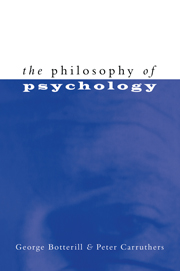Book contents
- Frontmatter
- Contents
- Preface
- Acknowledgements
- 1 Introduction: some background
- 2 Folk-psychological commitments
- 3 Modularity and nativism
- 4 Mind-reading
- 5 Reasoning and irrationality
- 6 Content for psychology
- 7 Content naturalised
- 8 Forms of representation
- 9 Consciousness: the final frontier?
- References
- Index of names
- Index of subjects
9 - Consciousness: the final frontier?
Published online by Cambridge University Press: 05 June 2012
- Frontmatter
- Contents
- Preface
- Acknowledgements
- 1 Introduction: some background
- 2 Folk-psychological commitments
- 3 Modularity and nativism
- 4 Mind-reading
- 5 Reasoning and irrationality
- 6 Content for psychology
- 7 Content naturalised
- 8 Forms of representation
- 9 Consciousness: the final frontier?
- References
- Index of names
- Index of subjects
Summary
Many people have thought that consciousness – particularly phenomenal consciousness, or the sort of consciousness which is involved when one undergoes states with a distinctive subjective phenomenology, or ‘feel’ – is inherently, and perhaps irredeemably, mysterious (Nagel, 1974, 1986; McGinn, 1991). And many would at least agree with Chalmers (1996) in characterising consciousness as the ‘hard problem’, which forms one of the few remaining ‘final frontiers’ for science to conquer. In the present chapter we discuss the prospects for a scientific explanation of consciousness, arguing that the new ‘mysterians’ have been unduly pessimistic.
Preliminaries: distinctions and data
In this opening section of the chapter, we first review some important distinctions which need to be drawn; and then discuss some of the evidence which a good theory of consciousness should be able to explain.
Distinctions
One of the real advances made in recent years has been in distinguishing between different notions of consciousness (see particularly Rosenthal, 1986; Dretske, 1993; Block, 1995; and Lycan, 1996) – though not everyone agrees on quite which distinctions need to be drawn. All are agreed that we should distinguish creature-consciousness from mental-state-consciousness. It is one thing to say of an individual person or organism that it is conscious (either in general or of something in particular); and it is quite another thing to say of one of the mental states of a creature that it is conscious.
It is also agreed that within creature-consciousness itself we should distinguish between intransitive and transitive variants. To say of an organism that it is conscious simpliciter (intransitive) is to say just that it is awake, as opposed to asleep or comatose.
- Type
- Chapter
- Information
- The Philosophy of Psychology , pp. 227 - 271Publisher: Cambridge University PressPrint publication year: 1999



